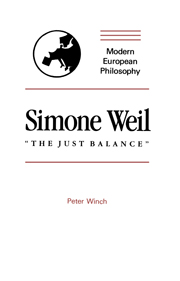Book contents
- Frontmatter
- Contents
- Acknowledgements
- 1 Introduction
- 2 The Cartesian background
- 3 The sensations of the present moment
- 4 “La simple perception de la nature est une sorte de danse”
- 5 Language
- 6 Necessity
- 7 Equilibrium
- 8 “Completely free action”
- 9 The power to refuse
- 10 “The void”
- 11 Geometry
- 12 Incommensurability
- 13 Beauty
- 14 Justice
- 15 “A supernatural virtue”?
- Notes
- Bibliography
- Index
- Frontmatter
- Contents
- Acknowledgements
- 1 Introduction
- 2 The Cartesian background
- 3 The sensations of the present moment
- 4 “La simple perception de la nature est une sorte de danse”
- 5 Language
- 6 Necessity
- 7 Equilibrium
- 8 “Completely free action”
- 9 The power to refuse
- 10 “The void”
- 11 Geometry
- 12 Incommensurability
- 13 Beauty
- 14 Justice
- 15 “A supernatural virtue”?
- Notes
- Bibliography
- Index
Summary
The purpose of this book is to explore some of the most important philosophical issues underlying Simone Weil's thinking. She did not herself discuss the distinction between questions that are philosophical and those that have some other character. I do not wish to suggest that she should have done this. In so far as it is necessary to draw such lines at all, the best attitude towards them seems to me to be a pragmatic one: to wait until some particular issue makes the drawing of a line desirable and then to draw it in a way which clarifies that issue. I mean to imply by this that it will be appropriate to draw the lines in rather different places in relation to different issues. It will also undoubtedly be the case that writers who work in different philosophical traditions will have a multiplicity of ideas about where, if at all, such lines should be drawn. This is to be expected and not, in my judgment, to be deplored.
But while there is no point in trying to legislate in a comprehensive way about what is philosophy and what is not, it does seem to me that sometimes one needs to raise a question of that form. One needs to be clear where a particular discussion belongs in order to determine how precisely it is to be understood, what kinds of criticism it is appropriate to develop in relation to it, what kinds of reasoning one should look for as a defence, what are its further implications.
- Type
- Chapter
- Information
- Simone Weil: "The Just Balance" , pp. 1 - 4Publisher: Cambridge University PressPrint publication year: 1989

